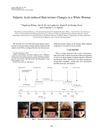 5 citations,
February 2014 in “PubMed”
5 citations,
February 2014 in “PubMed” Hair loss in Telogen effluvium is often chronic, linked to stress, and lacks a confirmed treatment, but topical corticosteroids may be used.
 February 2015 in “Current problems in dermatology”
February 2015 in “Current problems in dermatology” The document provides a comprehensive guide for dermatologists to diagnose and treat hair loss.
 12 citations,
June 2003 in “Journal of the European Academy of Dermatology and Venereology”
12 citations,
June 2003 in “Journal of the European Academy of Dermatology and Venereology” Some psychoactive drugs can cause skin reactions, with carbamazepine having a higher risk, and stopping the drug and seeing a dermatologist is important.
 10 citations,
March 1992 in “European Archives of Psychiatry and Clinical Neuroscience”
10 citations,
March 1992 in “European Archives of Psychiatry and Clinical Neuroscience” Hair loss from mood stabilizers can grow back, but the reasons why are not fully understood.
 2 citations,
June 2017 in “Psychiatry and clinical psychopharmacology”
2 citations,
June 2017 in “Psychiatry and clinical psychopharmacology” Stopping the antidepressant agomelatine improved hair loss in a patient.
 November 2015 in “Clin-Alert”
November 2015 in “Clin-Alert” Some medications and supplements can cause serious side effects, including hair loss, heart rhythm problems, liver injury, and other health issues.
64 citations,
January 2001 in “Pharmacotherapy The Journal of Human Pharmacology and Drug Therapy” Misoprostol has many medical benefits, including protecting against injuries, aiding in disease treatment, and improving drug effects.
 7 citations,
January 2015 in “Current problems in dermatology”
7 citations,
January 2015 in “Current problems in dermatology” Hair loss can be caused by stress, infections, drugs, and various diseases, with treatment depending on accurate diagnosis.
 April 2007 in “Dermatologic Clinics”
April 2007 in “Dermatologic Clinics” Understanding drug effects and careful monitoring are crucial for safe and effective dermatology treatments.
 13 citations,
March 1990 in “JAMA”
13 citations,
March 1990 in “JAMA” Topical eye β-blockers might cause hair loss, which usually gets better after stopping the medication.
 55 citations,
November 2004 in “Expert opinion on drug safety”
55 citations,
November 2004 in “Expert opinion on drug safety” Chemotherapy often causes hair loss, nail changes, and mouth issues, but these are usually manageable.
 20 citations,
March 1990 in “JAMA”
20 citations,
March 1990 in “JAMA” Topical eye β-blockers may cause hair loss.

Eye drops with β-blockers may cause hair loss.
 3 citations,
January 2014 in “Middle East African Journal of Ophthalmology”
3 citations,
January 2014 in “Middle East African Journal of Ophthalmology” A woman lost her hair after taking acyclovir, but it grew back when she stopped the medication.
 January 2014 in “IOSR journal of pharmacy”
January 2014 in “IOSR journal of pharmacy” Adalimumab can cause complete hair loss in rare cases.
 2 citations,
July 1999 in “International Journal of Clinical Practice”
2 citations,
July 1999 in “International Journal of Clinical Practice” Common baldness treatments include cosmetic methods, medication like minoxidil, and surgery, but no cure exists.
 August 1994 in “Drugs & Therapy Perspectives”
August 1994 in “Drugs & Therapy Perspectives” The document concludes that H2-antagonists and proton pump inhibitors are highly effective for ulcers, eradicating Helicobacter pylori is important to prevent recurrence, and misoprostol helps with NSAID-related ulcers.
 August 1994 in “Drugs & Therapy Perspectives”
August 1994 in “Drugs & Therapy Perspectives” Psoriasis treatments range from topical creams to systemic medications with serious side effects, and while treatments can manage symptoms, there is no cure.
 7 citations,
July 2007 in “Pharmacotherapy: The Journal of Human Pharmacology and Drug Therapy”
7 citations,
July 2007 in “Pharmacotherapy: The Journal of Human Pharmacology and Drug Therapy” The medication lopinavir-ritonavir may cause severe hair loss.
 March 2024 in “Research Square (Research Square)”
March 2024 in “Research Square (Research Square)” Scalp cooling therapy helps preserve hair during chemotherapy for most patients.
 14 citations,
August 2009 in “Cancer epidemiology”
14 citations,
August 2009 in “Cancer epidemiology” AHCC reduces hair loss and liver injury caused by chemotherapy in rodents.
 13 citations,
January 2007 in “Epilepsia”
13 citations,
January 2007 in “Epilepsia” Valproic acid can cause reversible hair curling and persistent hair thinning.
 9 citations,
January 2018 in “BioMed Research International”
9 citations,
January 2018 in “BioMed Research International” Tetrahydroxystilbene Glucoside may help prevent hair loss by blocking certain pathways that lead to cell death.
 5 citations,
July 2021 in “Basic & Clinical Pharmacology & Toxicology”
5 citations,
July 2021 in “Basic & Clinical Pharmacology & Toxicology” Melatonin may protect ear cells from damage caused by nicotine.
 23 citations,
February 2015 in “International Journal of Molecular Sciences”
23 citations,
February 2015 in “International Journal of Molecular Sciences” Colchicine can inhibit hair growth by affecting cell activity and protein expression in hair follicles.
 1 citations,
August 2024 in “Pharmaceuticals”
1 citations,
August 2024 in “Pharmaceuticals” Goat placenta extract in a special delivery system improved hair growth and thickness in chemotherapy patients.
 159 citations,
September 2001 in “European Journal of Cancer Care”
159 citations,
September 2001 in “European Journal of Cancer Care” Chemotherapy-induced hair loss significantly affects patients' well-being, and nurses are key in helping them cope, but more research is needed to find effective treatments.
2 citations,
June 2016 in “Düşünen Adam” Venlafaxine can cause hair loss, which stops after discontinuation.
 1 citations,
March 1989 in “The BMJ”
1 citations,
March 1989 in “The BMJ” A woman's hair grew back while she was taking sulphasalazine for arthritis.
13 citations,
April 2010 in “Journal of dermatological science” Chemotherapy-induced hair loss is partly due to decreased laminin-511 and increased laminin-332.



























